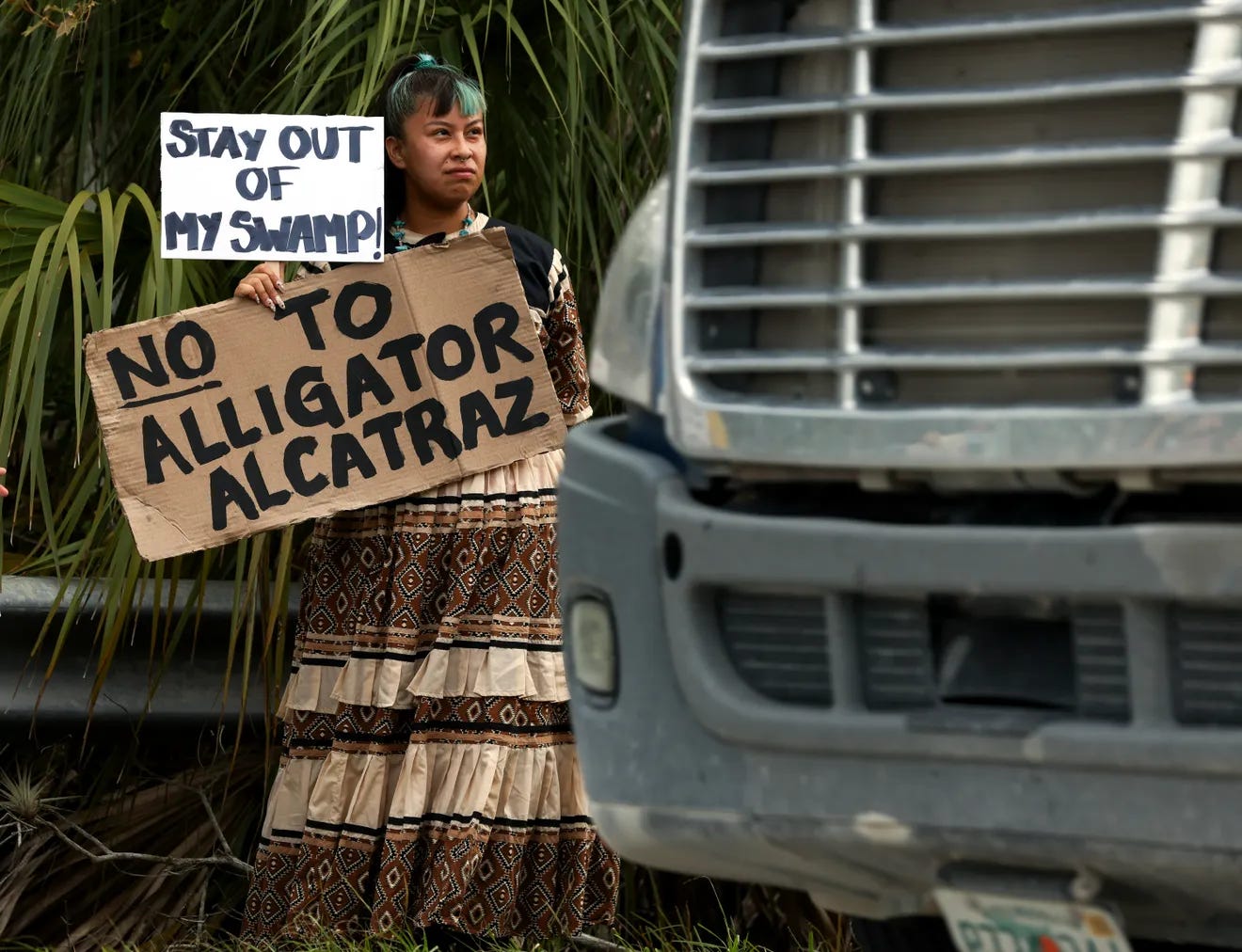Alligator Alcatraz
Why a new I.C.E. facility is being built in the middle of the vicious swamps of the Florida Everglades - making ready to welcome the nation's newest batch of undocumented migrants
Florida is back in the news again. Every so often the Sunshine State will suddenly resurface above the parallel of cultural controversy - stirring outrage or inflicting social shock and disbelief by some absurdly random act that’s gone viral. The trend has a moniker known as “Florida Man.”
Some stories like these will at times come out from the Southern tropic that will question every single presumption that the American public has ever had about Florida, a place as exotic as it is quintessentially American. Local and yet foreign. It can also be a summer destination for the snowbirds from Jersey, or the excited travelers on holiday from Europe. But for many who live there, Florida can also be an extraterrestrial wasteland for the rural natives who can’t wait to get out.
Miami - the archetypical residence of every walk of life has grown from its sleepy tropical gateway for America’s retirees from the Jewish community during the 1950s into one of the most attractively diverse locations in the entire world.
Last week, however, the dark, swampy sawgrass of Florida’s vast Everglades made headlines across the United States, undoubtedly representing the newest battlefield in the fight over the issue of the millions of undocumented migrants residing in the country.
The Department of Homeland Security in conjunction with the Governor of the State of Florida Ron DeSantis, announced the construction of a temporary detainment facility in the middle of the Everglades called Alligator Alcatraz. The facility will be operated by Immigration, Customs & Enforcement (I.C.E.), and partially funded by FEMA, is designed to house undocumented migrants subject to deportation from the United States.
I.C.E agents across the country have been scouting American communities with giant bullseyes on their backs, targeted by liberal activists and anti-I.C.E. organizations committed to putting up roadblocks for the agency tasked to enforce the administration’s tough and bare-knuckled campaign of removing individuals illegally taking shelter on U.S. soil.
On Friday the Supreme Court came down with a monumental ruling that limited the powers of wide-ranging national injunctions issued by federally appointed judges who have been challenging the White House on various issues, especially the battle over immigration.
Federal district court judges have been a thorn in the president’s side since taking office - who by Executive Orders has moved swiftly in an effort to hammer through some of his policies earlier on in his second term as Commander-in-Chief.
Following the ruling that will give President Trump the runway that he’s been looking for, the administration will now be eager to accelerate the herculean feats of expediting the deportation of a gargantuan-sized backlog of undocumented migrants, millions of whom are leftovers from the massive wave of illegal entries that took place during the Biden era. However, in order for the plan to be successful, the administration will need more of one thing - beds.
The site of the facility - dubbed Alligator Alcatraz - is a sprawling 36-acre property that will be requisitioned into a temporary detainment facility capable of housing 5,000 undocumented migrants. The site is an abandoned airfield leftover from a failed project that was started in the 1960s to build the largest airport in the country. It now sits 40 miles away from civilization, surrounded by the vast expanse of the brutal nature the Florida Everglades has to offer.
The wildlife that inhabits the terrain, including an almost limitless supply of vicious alligators and Florida pythons that can stretch 30 feet long were advertised by the site’s proponents as the ultimate deterrent for any potential escapees who would consider fleeing from the facility. Florida Attorney General James Uthmeier remarked in an interview with FOX Business, “If somebody were to get out, there’s nowhere to run, nowhere to hide, only the alligators and pythons are waiting. That’s why I like to call it ‘Alligator Alcatraz’.”
But the same complainants that halted the initial development of this site during the 1960s have also come out to protest the construction of Alligator Alcatraz. Environmental organizations have filed a lawsuit with the state, claiming that construction threatens the ecological sensitivity of the surrounding environment and the species that inhabit it.
Native American tribes like the Miccosukee Tribe - a predominant indigenous group native to South Florida have expressed concern over the construction too, citing the site’s close proximity to traditional villages and ceremonial burial grounds.
Over the weekend hundreds of protesters and environmentalists lined the shoulders of U.S. Highway 41 - or Tamiami trail to the locals - with signs and placards to protest the construction already underway.
Convoys of trucks and heavy equipment vehicles hauling concrete and materials piled into the compound, dumping their loads to be used for the construction of the facility. The Governor of the State of Florida Ron DeSantis said that the facility is expected to be ready by Tuesday, and prepared to intake its first group of migrants for processing.
DeSantis boasted that the existing adjacent airstrip will be commandeered by I.C.E. for on-the-spot deportations to migrant countries of origin as a “one-stop shop” for the administration’s latest maneuver to streamline mass removals of illegal immigrants from the United States.

The public’s appetite for Trump’s promise of mass deportations was larger than the Democrats anticipated. Although initially vowing to focus on migrants with violent criminal records residing here in the country illegally, immigration enforcement authorities have cast a wider net, picking up undocumented migrants without criminal records, too.
Critics accuse the president of misleading the American people, arguing that those who are gainfully employed and actively contributing as productive members of society should be allowed to stay, which has been the unstated practice of previous administrations for decades.
Contrarily, Americans who support total deportation for whatever category of undocumented migrants argue that those who have transgressed U.S. borders - often the Southern border - without documentation, nor authorization from the U.S. government have violated federal immigration statutes, thereby committing a crime and therefore should not be exempt from the same standards as everyone else.
There are roughly 750,000 illegal migrants currently in the United States who have been issued deportation orders by immigration courts. Governor Ron DeSantis claims that his state has many more than that, which is what Alligator Alcatraz is being designed for - to hold these individuals and then process them for expedited removal.
The lack of immigration enforcement during the previous four years of the Biden administration created an environment that incentivized people from various regions of the world to come into the United States in many cases without any degree of accountability. Estimates have ranged that 10 to 12 million undocumented migrants crossed the U.S. Southern border illegally, redrawing federal resources originally meant for other needs, and exhausting the resources of local jurisdictions that did not have the capacity to sustain the massive inflow that was coming into the country at the time. Many other experts estimate as much as 20 million people came into the country illegally under the Biden administration.
Proponents of the current administration’s aggressive immigration strategy like career Border Patrol official and current Border Czar under the Trump administration, Tom Homan have previously explained the strategy from the White House on the issue of immigration is simply a response to the calamity of the illegal and unfettered mass migration that flourished during the previous four years.

The president’s support from the American public for his tough stance on migration has remained steady after more than six months in office with a majority in favor of continued deportations.
Mass deportation was a major campaign promise prior to the election, and the administration has remained determined to follow through on it. However, reports have mentioned several weeks ago that the administration had expressed some measure of dissatisfaction in the insufficient amount of daily deportations taking place. The president has pressured his administration to find ways to increase these numbers. Alligator Alcatraz is just another tool in the toolbox to be used by authorities.
Border Czar Tom Homan has come out quite publicly in support of the president’s paramount piece of legislation known as The One Big Beautiful Bill, urging members of Congress to get behind it so that the administration can carry out the president’s promise to the American people. The Bill will provide a significant amount of resources to increase border security, but it will also (1) increase funding for I.C.E. to expand detention capacity and deportation efforts within the U.S.; (2) build new detention facilities, and increase the number of beds available for detaining immigrants, potentially including families, and (3) allocate funding for hiring additional I.C.E. agents to conduct deportation operations throughout U.S. cities.
The emotions on the issue and the political partisanship that come with it will certainly intensify in the coming months as the administration displays no signs of loosening up its grip on the futures of undocumented migrants in the country. The construction of temporary I.C.E. facilities to tackle the problem is representative of a government that is taking these obligations very seriously to say the least, and one that believes that it bears with it a mandate provided to it by the American people.
Tensions have been running high on the immigration issue, especially after anti-I.C.E demonstrations and violent riots took over some portions of Los Angeles, California only a few weeks ago. It may be reasonable to assume that the fight over undocumented migrants will likely persist moving forward.




